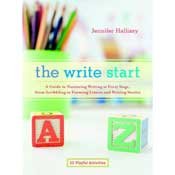I firmly believe that anyone can be a good writer. Writing leads to clear thinking, and reading and writing feed each other. Don't give up on yourself or your child, or think that you don't have writing "talent." Just like anything else, writing is a craft that needs to be developed and practiced.
No surprise: Children mirror their parents' interest in the written word. Now, that doesn't mean you have to be a great writer, or even educated, to inspire young writers: My own mother was illiterate but thrust encyclopedias and notepads in front of me and showed me her passion for the words she couldn't write. I write because she couldn't.
Start early to nurture writing in whatever ways you can. The delightful book, "The Write Start," by pediatric occupational therapist Jennifer Hallissy (Trumpeter Books, 2010, $20.50) gives 52 ways to nurture writing in your child (one a week). All are simple and fun such as building a "family tree" out of real leaves and making your own books.
First, though, you must create an environment where the written word is valued. Have books front and center in your home, and make sure you and your child have a place to write and play with the written word, stocked with pens, paper, crayons, markers, stamps, index cards, erasers, glue, scissors, an alphabet chart and much more.
From there, get creative with your child and words:
• Help your child start a writer's scrapbook filled with pieces of their writing, drawings, pictures, etc. (and notes to you, report
cards, etc.).
• Teach your child to make lists—from what they do when they wake up, to their goals (this will also teach them to start managing their time) and play lists of songs they like.
• Every kid should have a diary or journal (I started one in the second grade). Little bitty kids can start with "What Color Was Your Day?" and just scribble on a page with a different chosen crayon or pencil that day. Young storytellers can write about the high point of their day and the low point (adults should do this, too).
• Teach them to write fun, creative thank-you (or "You rock!") notes. They can make them, too, in their cool little writing/creative corner.
Most importantly, Hallissy warns, kids need to see you writing stuff—from lists to journals to letters. Don't be the parent who can never find a pen. Use one, and they will, too.
More like this story
More stories by this author
- EDITOR'S NOTE: 19 Years of Love, Hope, Miss S, Dr. S and Never, Ever Giving Up
- EDITOR'S NOTE: Systemic Racism Created Jackson’s Violence; More Policing Cannot Stop It
- Rest in Peace, Ronni Mott: Your Journalism Saved Lives. This I Know.
- EDITOR'S NOTE: Rest Well, Gov. Winter. We Will Keep Your Fire Burning.
- EDITOR'S NOTE: Truth and Journalism on the Front Lines of COVID-19



Comments
Use the comment form below to begin a discussion about this content.